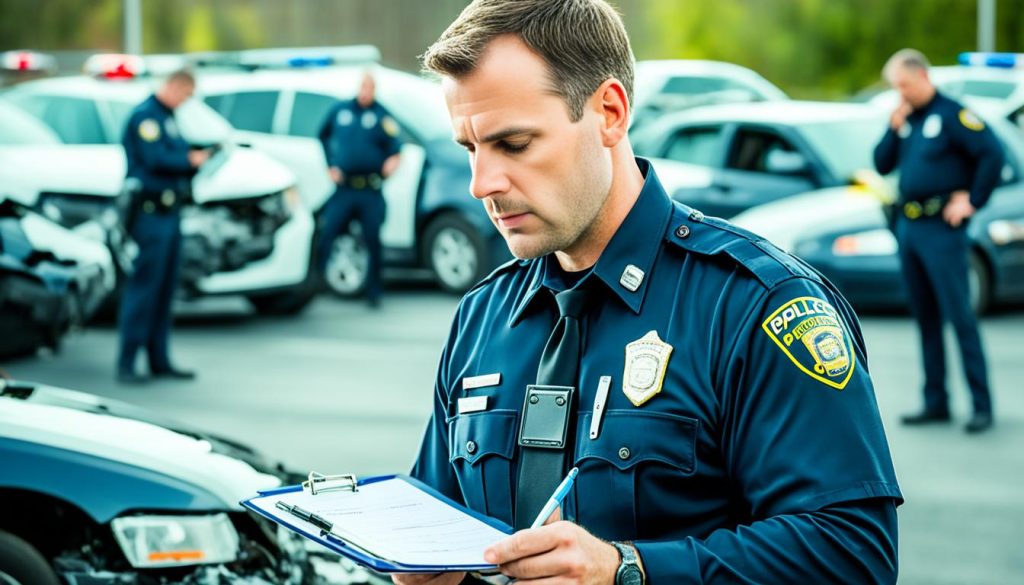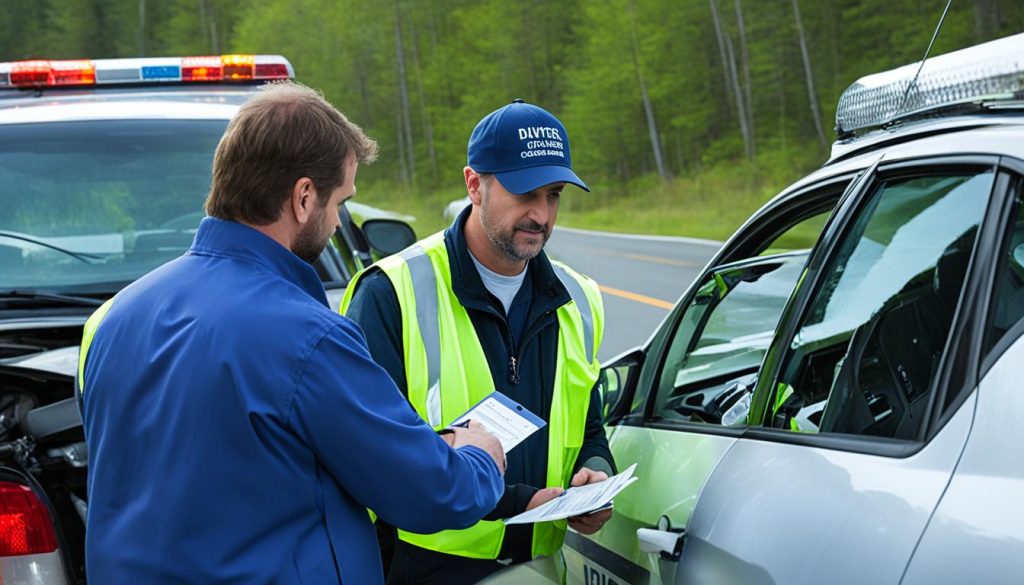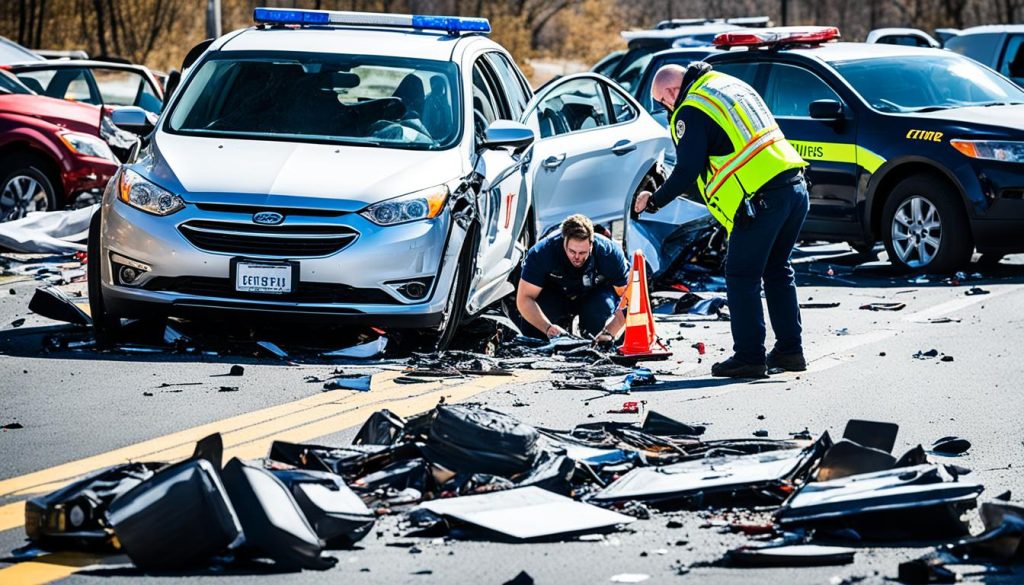When you find yourself injured in an accident, taking immediate action is crucial for safeguarding your physical, financial, and legal well-being. Seeking immediate medical treatment, contacting law enforcement and obtaining a police report, exchanging information with other parties, documenting the scene of the accident, notifying your insurance company, and seeking legal advice are all important steps to take following an accident. These steps will help ensure a smooth claim process and legal resolution.
Key Takeaways:
- Seek immediate medical treatment to protect your health and strengthen potential legal claims.
- Contact law enforcement and obtain a police report as valuable evidence for establishing liability.
- Exchange information with other parties involved in the accident to document crucial details.
- Document the scene of the accident through photographs and notes to preserve evidence.
- Notify your insurance company promptly to comply with state laws and preserve coverage.
Following the key steps outlined after an accident and seeking essential legal advice can greatly contribute to an effective resolution. By prioritizing immediate medical treatment, contacting law enforcement, exchanging information with other parties, documenting the scene of the accident, notifying your insurance company, and seeking legal assistance, you can safeguard your physical, financial, and legal well-being. These steps ensure a smooth claim process and legal resolution, allowing you to navigate the aftermath of an accident with confidence.
Seeking Immediate Medical Treatment: Your Health Comes First
When injured in an accident, your top priority should be seeking immediate medical treatment. It is essential to prioritize your health, regardless of the severity of your injuries. Even seemingly minor injuries may have underlying complications that may not exhibit immediate symptoms.
Delaying medical care can have detrimental effects on your well-being. Not seeking immediate treatment can worsen your injuries and potentially hinder your chances of receiving proper compensation. Additionally, insurance disputes may arise if there is a lack of documentation regarding your injuries and the timing of your medical care.
Seeking immediate medical attention is crucial for several reasons. Firstly, it ensures that you receive the necessary care to address your injuries promptly. Early medical intervention can prevent further complications and promote a more efficient recovery process.
Furthermore, seeking immediate medical treatment strengthens your potential legal claims and insurance coverage. By promptly visiting a healthcare professional, you establish a clear link between the accident and your injuries. This documentation is crucial when it comes to filing insurance claims or pursuing legal action.
“Seeking immediate medical attention not only ensures proper care but also strengthens potential legal claims and insurance coverage.”
It is important to note that certain injuries may not manifest symptoms immediately. Whiplash, for example, may take several hours or even days to present noticeable symptoms. By seeking immediate medical attention, you increase the likelihood of detecting any underlying injuries and promptly addressing them.
Remember, your health is paramount, and seeking immediate medical treatment after an accident is a vital step in your recovery process. Don’t hesitate to visit a healthcare professional to ensure your well-being and protect your legal rights.
Resources for Immediate Medical Care
- Contact your primary care physician or visit an urgent care facility to receive immediate medical attention.
- If your injuries are severe or life-threatening, call 911 for emergency medical services.
- Research local hospitals or medical centers that specialize in the type of injury you sustained.
- Reach out to your insurance provider for recommendations on healthcare professionals or facilities in your network.
Contact Law Enforcement and Obtain a Police Report: Building Your Case
When you find yourself involved in an accident, one of the key steps to building a strong case is to contact law enforcement and obtain a police report. The police report serves as valuable evidence that can corroborate your account of the accident, providing essential details such as the date, time, and location of the incident. It also contains statements from involved parties and witnesses, as well as preliminary assessments of fault.
Having a police report is crucial for establishing liability and clarifying the circumstances surrounding the accident. It serves as an objective record of the incident, making it indispensable when dealing with insurance companies or pursuing legal action. The report helps in the accident investigation process, providing an official record of events that can be used to support your case.
Law enforcement professionals are trained in accident investigation and have experience in gathering evidence and documenting the scene. Their professional expertise ensures that accurate information is recorded, which can significantly impact the outcome of your case. By involving law enforcement in the immediate aftermath of an accident, you can obtain an unbiased account that strengthens your position when negotiating with insurance companies or presenting your case in court.
“A police report not only provides an objective account of the accident but also helps establish liability and responsibility. It serves as strong evidence when negotiating with insurance companies or presenting your case in court.”
In addition to establishing liability, a police report can also provide important details for insurance purposes. Insurance companies rely on the information contained in the report to process claims and determine fault. Without a police report, it can become challenging to prove the circumstances surrounding the accident and establish fault.
When obtaining a police report, it is essential to ensure that all relevant information and statements are accurately recorded. Be proactive in providing a detailed account of the incident to the law enforcement officer, including any injuries, damages, or witness statements that may be relevant to your case. This will ensure that the report is comprehensive and supports your claim.
Remember, the police report is a critical piece of evidence when building your case after an accident. It helps establish liability, provides an objective account of the accident, and supports your claim when dealing with insurance companies or pursuing legal action.

Exchange Information with Other Parties: Documenting Crucial Details
When you find yourself involved in an accident, exchanging information with the other parties is a crucial step in documenting crucial details and ensuring a smooth claims process.
Collecting full names, contact information, license plate numbers, insurance details, and car details from all individuals involved is essential. This information establishes accurate documentation and helps track down responsible parties.
When processing insurance claims, this collected information plays a vital role in determining financial responsibility. It allows the insurance company to assess and allocate liability appropriately. Moreover, having comprehensive documentation of the accident details helps expedite the claims process and reduces the chances of disputes or uncooperative parties complicating the resolution.
To emphasize the importance of exchanging information, it’s crucial to remember that insurance companies rely on accurate documentation to evaluate claims effectively. By exchanging information with other parties, you enable the smooth processing of your insurance claim while ensuring that all parties involved are being held accountable for their actions.
Documenting Accident Details: A Robust Approach
Accidents can often be overwhelming, making it easy to forget to document important details. However, documenting accident details is critical for a successful insurance claim and potential legal proceedings.
“Accurate documentation serves as a powerful tool in strengthening your case. It helps you establish a clear narrative of the events and supports your claim with tangible evidence.”
When documenting accident details, make sure to take clear and comprehensive photographs of any damages to the vehicles and injuries sustained. Additionally, capture the surrounding environment, including traffic conditions, weather, and road conditions, as these details could be relevant to your case.
Furthermore, jot down a detailed account of the accident, noting the date, time, location, and any conversations or witnesses. These notes will aid in reconstructing the sequence of events accurately and provide valuable evidence for insurance claims or any potential legal proceedings.
Remember, thorough documentation not only helps in resolving insurance claims but also strengthens your position when pursuing legal action. It provides a clear picture of the accident, enhancing the chances of a fair and favorable resolution.

Capturing crucial accident details through proper documentation is essential for a smooth claims process and satisfactory resolution.
Document the Scene of the Accident: Capturing Crucial Details
When you find yourself in an accident, it is essential to document the scene thoroughly to preserve crucial evidence. By documenting the accident scene through photographs and detailed notes, you can strengthen your case and ensure all crucial details are recorded.
Photographs play a vital role in documenting the accident scene. Take clear and comprehensive photos of various aspects such as:
- The vehicle damage inflicted as a result of the accident
- Any injuries sustained by you or others involved
- The traffic signals and signs present at the scene
- The prevailing weather conditions at the time of the accident
- The road conditions, including skid marks or debris
In addition to photographs, notes are crucial for accurately documenting the accident. Write down a detailed account of the incident, including:
- The date and time of the accident
- The location where the accident occurred
- The traffic conditions at the time of the accident
- The names and contact details of any witnesses
- Conversations or statements made by involved parties
The documentation you compile helps establish liability and plays a crucial role in supporting insurance claims and any potential legal proceedings. It serves as concrete evidence of the circumstances surrounding the accident. These photographs and notes ensure that accurate and detailed information is available, making it easier to establish fault and seek the compensation you deserve.
Remember, without proper documentation, it can become challenging to prove the circumstances surrounding the accident. Take the time to document the scene thoroughly to strengthen your case and preserve essential evidence.

Notify Your Insurance Company: Timely Action Is Essential
After being involved in an accident, it is crucial to promptly notify your insurance company in order to comply with state laws and preserve your coverage. Notifying your insurance company immediately is particularly important, as some states require this timely action for coverage to apply. Failing to adhere to these regulations can jeopardize your ability to file a claim and receive the compensation you are entitled to.
By notifying your insurance company in a timely manner, you ensure that your insurance coverage remains intact and that your insurer can initiate an investigation while the details of the accident are fresh. This investigation is crucial for accurately determining liability and assessing the circumstances surrounding the accident. Timely notification also allows you to access immediate assistance, such as towing or rental car coverage, if applicable.
Remember, notifying your insurance company is not only a legal requirement but also a way to protect your own interests. By providing timely notification, you act in accordance with state laws and preserve your coverage, ensuring that you are not left facing the financial burden of the accident on your own.
If you’re unsure about the specific requirements for notifying your insurance company after an accident, refer to your policy or consult with a legal professional who can provide guidance tailored to your situation.

Preservation of Coverage:
“Notifying your insurance company within the required timeframe is crucial for the preservation of your coverage and the protection of your rights. Failure to meet these obligations can lead to unnecessary complications when filing your claim.” – Attorney John Smith
By promptly notifying your insurance company, you not only comply with state laws but also ensure that you receive the immediate assistance and protection you need during this challenging time.
Conclusion
By following the key steps outlined after an accident and seeking essential accident legal advice, you can effectively navigate the claim process and achieve a satisfactory accident resolution. Prioritizing immediate medical treatment ensures your health and strengthens potential legal claims, while contacting law enforcement and obtaining a police report establishes liability and provides valuable evidence. Exchanging information with other parties and documenting the scene of the accident contribute to a smooth claims process and preserving crucial details. Notifying your insurance company promptly preserves coverage and allows for immediate assistance. Seeking legal assistance provides you with the necessary expertise to navigate the legal complexities and ensure a favorable resolution. By taking these steps, you safeguard your physical, financial, and legal well-being, making the aftermath of an accident more manageable.




No comments! Be the first commenter?